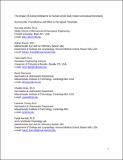The Impact of Oral Promethazine on Human Whole-Body Motion Perceptual Thresholds
Author(s)
Karmali, Faisal; Priesol, Adrian J.; Clark, Torin K.; Young, Laurence R.; Sherwood, David P.; Oman, Charles M; Young, Laurence Retman; Diaz Artiles, Ana; ... Show more Show less
Download10162_2017_622_ReferencePDF.pdf (591.4Kb)
OPEN_ACCESS_POLICY
Open Access Policy
Creative Commons Attribution-Noncommercial-Share Alike
Terms of use
Metadata
Show full item recordAbstract
Despite the widespread treatment of motion sickness symptoms using drugs and the involvement of the vestibular system in motion sickness, little is known about the effects of anti-motion sickness drugs on vestibular perception. In particular, the impact of oral promethazine, widely used for treating motion sickness, on vestibular perceptual thresholds has not previously been quantified. We examined whether promethazine (25 mg) alters vestibular perceptual thresholds in a counterbalanced, double-blind, within-subject study. Thresholds were determined using a direction recognition task (left vs. right) for whole-body yaw rotation, y-translation (interaural), and roll tilt passive, self-motions. Roll tilt thresholds were 31 % higher after ingestion of promethazine (P = 0.005). There were no statistically significant changes in yaw rotation and y-translation thresholds. This worsening of precision could have functional implications, e.g., during driving, bicycling, and piloting tasks. Differing results from some past studies of promethazine on the vestibulo-ocular reflex emphasize the need to study motion perception in addition to motor responses. Keywords: promethazine, motion sickness, human experiments, vestibular perception, anti-motion sickness drug, medication
Date issued
2017-04Department
Massachusetts Institute of Technology. Department of Aeronautics and AstronauticsJournal
Journal of the Association for Research in Otolaryngology
Publisher
Springer US
Citation
Diaz-Artiles, Ana, et al. “The Impact of Oral Promethazine on Human Whole-Body Motion Perceptual Thresholds.” Journal of the Association for Research in Otolaryngology, vol. 18, no. 4, Aug. 2017, pp. 581–90.
Version: Author's final manuscript
ISSN
1525-3961
1438-7573